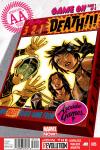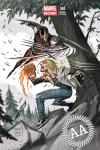|

By Paul Montgomery
Much as they dream of hitting reset on the wily Arcade’s deadly game, the young inhabitants of Murderworld must focus on surviving each day as living pawns in AVENGERS ARENA. Every new dawn demands of them hard and fast responses to questioned loyalties, an ever-changing environment and their own willingness to live when it might mean another could die.
Arcade drew first blood, but soon these reluctant contenders from the Avengers Academy, the Runaways and all corners of the Marvel Universe, may well relent and kill to survive. With past alliances tested and in some cases shattered, the game could change them before they can ever hope to change the game.
We spoke to writer Dennis Hopeless about taking AVENGERS ARENA to the next level.
Marvel.com: Heroism seems to get people killed in Murderworld.
Dennis Hopeless: [Laughs] I don’t know that that’s necessarily intentional. I sort of based the early conflicts in the book on “Survivor.” Particularly the early seasons of “Survivor,” where it’s very clear that several players are playing the game from the beginning and others take a while to figure out what’s going on. Therefore, you have people who have other motivations than to win the game who are taken advantage of by people who have just accepted that this is what’s going on. The whole storyline with the Nightstalker, who is showing up and attacking people at night, is a person who is very calculating. They’re trying to play the game and get other people off their game. You’ve got a character like Darkhawk, who’s a hero and a grown man, whose whole thing is “We can beat this, we can stop this. Every villain can be beaten. We’re going to do other things.” Because of that, he doesn’t have his eye on the ball and things don’t end up going very well for him.
Marvel.com: Thus far, friends and lovers ended up liabilities rather than assets. Do the kids look at it that way? Can familiarity become less comforting as this goes on?
Dennis Hopeless: Yeah. That’s a big part of it. Early on, the characters all kind of banded together in their most comfortable groups; maybe not the people that they’re best friends with, but with the people that they know the best. That will change and grow throughout the course of the series as those loyalties are tested and broken. People start to question whether they can trust anyone and have to decide who they’re willing to stand up for and who they’re willing to sacrifice. Early on, my goal was to make it so that they assess the situation but haven’t really thought it through. They’re all just kind of deal with it, if that makes any sense. By the end of the first arc, it’s become quite a bit clearer to people what’s going on and what they’re going to have to do. I think taking comfort in anything in Murderworld is kind of a bad idea.
Marvel.com: As the survivors dwindle as the game goes on, how does that affect the resolve of someone like Hazmat versus someone like X-23, just seeing those numbers?
Dennis Hopeless: Both of those girls are in very different places. X-23 is really well equipped for this game, from both a skills and power set standpoint. But, she’s also vowed not to kill. Her entire character up to this point has been about putting away the things that make her good for this. Issue #8 is all about Laura trying to deal with the fact that she’s perfect for all of this but wants no part of it. The strongest relationship that Hazmat had was taken away right off the bat. I think she understands better than anyone exactly how real the game is. She also tends to run a little hot and that is even intensified by what happened to Mettle in issue #1. She hasn’t necessarily bought in to killing everyone, but she’s going to do everything she can to protect her friends. That’s her primary thing now. She’ll do anything to keep the people that she has left safe.
Marvel.com: Should we worry about the quiet ones? Lying low seems like a really effective way to get through the game.
Dennis Hopeless: Yeah, definitely. There was something to what Arcade said at the beginning. The clever ones were hanging back. Several people realized right off the bat that this guy is clearly very powerful, we’re not going to be able to do anything here, let’s watch him and figure it out. Some of those people are just going to be concerned about surviving and staying away from the conflict. Others are the ones that are actively game playing from the beginning. I would say that the quiet ones who are in the shadows are probably better at surviving this than the people that Hazmat’s assisting.
Marvel.com: I imagine that some of the kids are more comfortable with the idea of hanging back and being passive than others. Some might think of that as cowardice. They’re not doing enough to help everyone else out. They’re lying low while friends, strangers, innocent people are dying.
Dennis Hopeless: The reason that we follow the characters from a different point of view each issue is that this situation affects everyone differently and everyone has a different agenda, whether they realize it or not. For some people, it would make more sense to hang back, try to stay alive, see what’s going to happen, keep an eye on things. Figure out if there’s going to be a way to save people or avoid conflict. Other people are avoiding conflict because they’re not confrontational. There are different kinds of people who would hang back. There are those people who are quick-tempered, quick to jump into things, or not necessarily that good at strategy. They don’t get that element of the game. I think the individual personalities of each character really affect how they react to this, what they do early on, and what they’ll continue to do as the game ramps up and gets more intense.
Marvel.com: X-23 bides her time under heaps of snow, lying in wait for hours. What’s going through her mind while she’s doing that? If you’re lying under the snow for a really long time just waiting, what are you thinking about while you’re under there?
Dennis Hopeless: Laura would probably be thinking about what she’s willing to do. What she’s out there doing is trying to find whoever it is that attacked one of her friends. The Avengers Academy cast at this point is her family. Justin’s been attacked and disappeared. At the same time, she doesn’t want to kill. She doesn’t want to buy in to what the game is and what Arcade wants her to do. She would be down there trying to decide, “If I catch this person, what am I going to do to them? Am I willing to kill? What will I do in that situation?” Luckily, the person that she finds is not that person that did it, so she doesn’t have to make that choice at the moment.
Marvel.com: A late addition to the ensemble, Darkhawk, keeps coming back as a true wild card in this game.
Dennis Hopeless: Everything isn’t necessarily as it appears with Darkhawk. There are plans going forward for Darkhawk, but as you saw in the end of issue #3, Chris has lost his amulet and appears to not be in very good shape. Darkhawk will be in the series and a big part of it, but how that works out is still a mystery.
Marvel.com: Arcade stole the show in issue #1. Should we expect more of his Willy Wonka meets Takeshi Kitano theatrics as the numbers begin to dwindle?
Dennis Hopeless: Arcade pokes his head in when he gets bored. Issues #5 and #6 are the next time that Arcade decides to really impose his will on things. Issue #7 is an Arcade focused issue where we learn the hows and whys of some of the stuff in Murderworld. If possible, and when he’s enjoying what’s happening, he prefers to sit back and let the thing play itself out. If he gets bored or thinks he can turn up the heat by a little manipulation, he’ll do that and we’ll see that from time to time.
Marvel.com: Does it ever get scary how fun it is to write a character like Arcade?
Dennis Hopeless: It is. It’s weird, because when I write what’s happening to the kids, I’m very much in the mindset of those characters. That’s really hard. Killing these great characters or putting them in mortal peril one way or the other is difficult and you have to force yourself to do it. You have to force yourself to do bad things to characters you love. But when you write Arcade, once you get in his head, you don’t care about other people. He’s self-obsessed. To him, these are just game pieces he can move around. I guess it is scary when I step back and look at it. Going inside Arcade’s mindset and it’s all “Gore is fun!” or whatever. [Laughs]
Marvel.com: They say when you’re in the most stressful situations you see what kind of person you truly are. Do you think that’s true here or is the situation so twisted that we’re seeing people act in ways that might be out of character?
Dennis Hopeless: Sure, to some extent. I think it’s also the case that who you are and who you’re going to be is not set in stone when you’re that age. Some of these characters are really young. Some are 13 or 14 years old. That’s honestly one of the brilliant things about AVENGERS ACADEMY. The reason that the Avengers set up this school and brought these kids in is because they’re damaged and there’s a real potential that these people could grow up to be bad and be super villains instead of super heroes. Testing your resolve and testing what kind of person you are down deep, for people who haven’t decided that for themselves, makes it more interesting. They’re making decision, they’re making choices, and the way that they deal with the situation will affect who they’re going to grow into and who they’re going to be. They’re going to have to deal with these decisions for the rest of their life. I see it both ways. I see the situation warping them while also telling them what they’re capable of and what they’re willing to do. 
|











